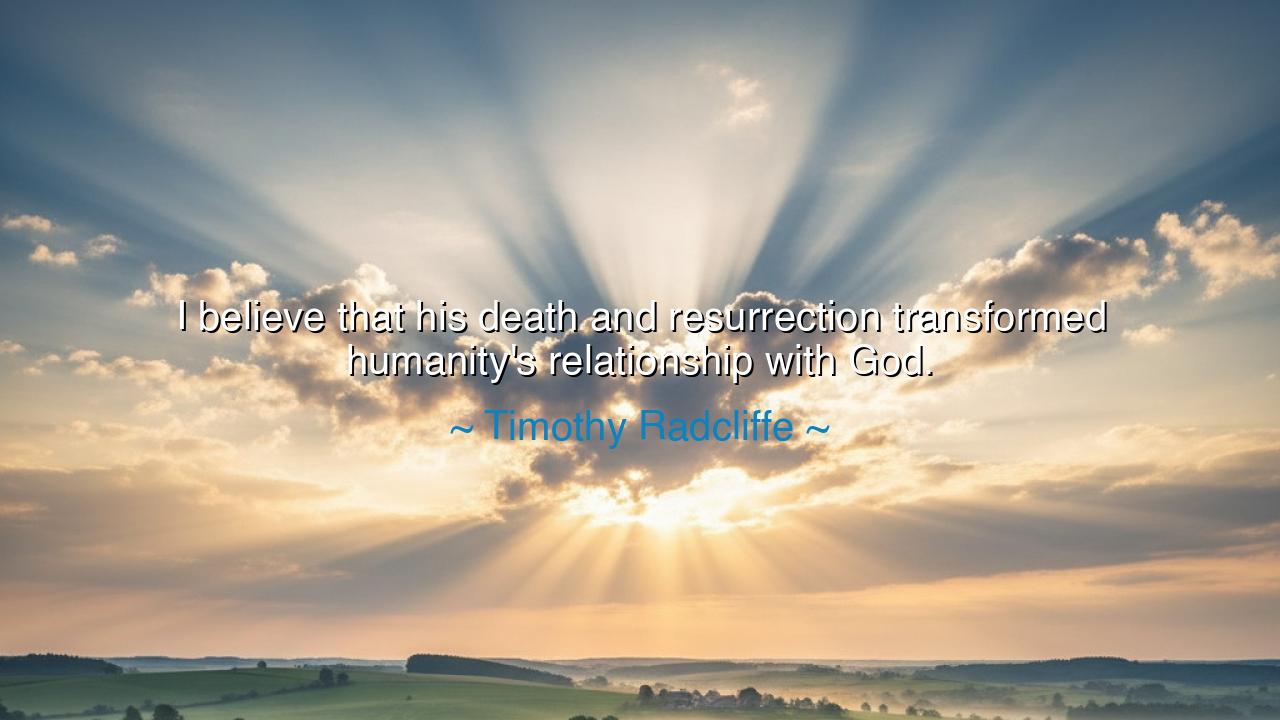
I believe that his death and resurrection transformed humanity's
I believe that his death and resurrection transformed humanity's relationship with God.






In the luminous and reverent words of Timothy Radcliffe, a man of deep contemplation and faith, we encounter a truth that has echoed across two millennia of human history: “I believe that his death and resurrection transformed humanity’s relationship with God.” In this single sentence lies the essence of the Christian mystery, the heart of redemption, and the eternal hope that through suffering comes renewal, and through death, life. It is not merely a statement of doctrine but a vision of transformation—a belief that the story of Christ’s death and resurrection changed forever the bond between the divine and the mortal, between Creator and creation.
To say that humanity’s relationship with God was “transformed” is to acknowledge that before that sacred event—the Passion of Jesus Christ—there existed a gulf between heaven and earth, between purity and the fallen heart of man. For generations, the ancient peoples knew God as power and law, distant and absolute. They worshiped through sacrifice, fearing wrath as much as seeking mercy. But in the death of Christ, that distance was crossed. The divine stepped into the human condition—not as king or conqueror, but as a servant who suffered. In the resurrection, that suffering was redeemed, and through it, humanity was invited into communion rather than submission. The relationship was no longer one of fear, but of love; no longer of debt, but of grace.
Timothy Radcliffe, a Dominican priest and theologian, speaks from a long tradition of Christian contemplation. As a spiritual teacher, he sees in the crucifixion not merely the tragedy of a righteous man, but the unveiling of divine love that embraces even death. For him, the resurrection is not just an event in time but a continual movement of hope within the soul of the world. It is the eternal proclamation that despair does not have the final word. Where humanity once trembled beneath the weight of sin and mortality, the risen Christ stands as proof that nothing—not even death—can separate man from the love of God.
History itself bears witness to this transformation. Before the cross, power ruled by the sword; after it, even the mightiest empires could not silence the whisper of forgiveness. Consider the early Christians who, in the days of Rome, faced lions and fire not with hatred, but with hymns upon their lips. Their courage was not born of madness, but of faith that death had been conquered. The world could no longer enslave them with fear, for the grave had become a doorway. Their blood became the seed of faith, and their witness reshaped civilization itself. Thus, Radcliffe’s words are not abstract—they describe a revolution of the spirit that altered the very fabric of human existence.
Yet this transformation is not only historical; it is deeply personal. For every soul that has ever known suffering, the death and resurrection of Christ offers a mirror of meaning. In pain, we see the crucifixion; in renewal, the resurrection. When we endure loss, we are drawn into the mystery of dying to self; when we rise again in compassion or courage, we taste the eternal life of the Spirit. The relationship with God becomes not a distant worship, but a living dialogue—a shared journey through the cross into light. Through this mystery, humanity no longer walks alone; God walks beside us, bearing our wounds as His own.
In this way, Radcliffe’s reflection speaks beyond theology—it speaks to the heart of every person who has known despair and dared to hope again. The transformation he describes is not confined to church or creed; it is a pattern woven into the rhythm of life itself. Each dawn after darkness, each reconciliation after division, each act of love after betrayal—these are small resurrections, the daily renewal of our bond with the divine. For to believe in resurrection is to believe that nothing is lost forever, and that every ending hides the seed of a beginning.
So, dear listener, the lesson is this: do not fear the dark nights of your life, for in them lies the promise of dawn. When you suffer, know that you stand within the same mystery that once lifted the cross into glory. Let your faith, like Radcliffe’s, be not a chain but a bridge—one that spans despair with hope, and death with life. For the death and resurrection of Christ are not distant relics of history, but the heartbeat of every human soul that chooses to rise again after falling. And in rising, you too renew humanity’s relationship with God—not as subject to master, but as child to Father, as beloved to Beloved, forever embraced in the light that no darkness can overcome.






AAdministratorAdministrator
Welcome, honored guests. Please leave a comment, we will respond soon